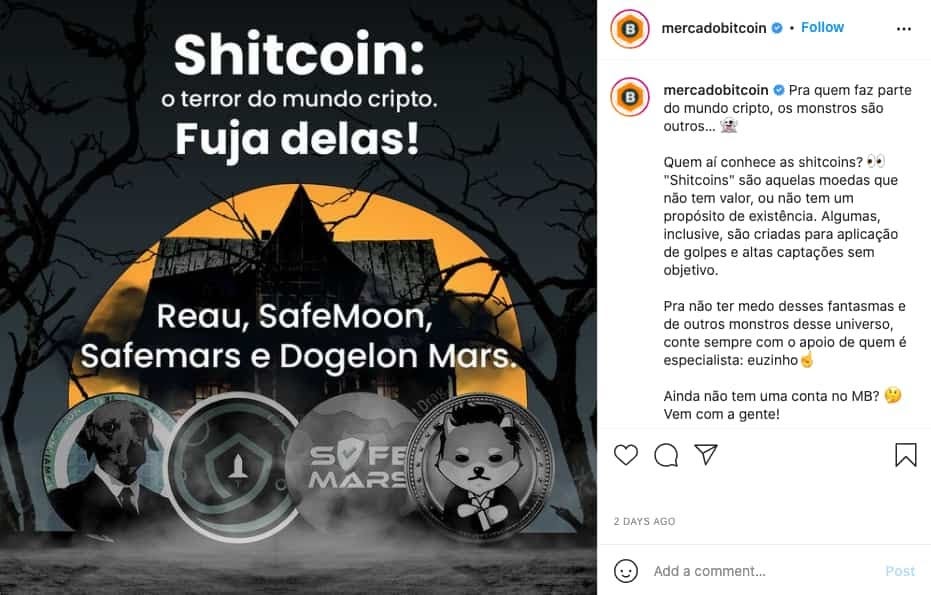🇧🇷 Brazil Crypto Report #19: Mercado Bitcoin vs. Shitcoins; B3 CEO Attacks Crypto Exchanges; NuBank Airdrop
👋 Hello everyone and welcome to 🇧🇷 Brazil Crypto Report for November 1-5. I had the privilege of meeting several readers last week in 🇵🇹 Lisbon for Web Summit and the surrounding crypto events.
It was my first time visiting the motherland and I must say I enjoyed the experience and the city’s charm. Easy to see why so many crypto and tech people are relocating there.
In this week’s report we touch on:
🔥 A fun trolling/pissing match between Mercado Bitcoin and “shitcoiners” on social media
💣 B3 CEO Gilson Finkelsztain’s harsh words for Brazil’s crypto exchanges, as well as the volleys fired back at him by the industry
💰NuBank’s plans to borrow from the DeFi playbook by airdropping equity shares to customers in its forthcoming public offering and some
💲Transfero is launching a new exchange aimed at retail customers in Brazil and across Latam
As always, thanks for reading.
-AWS
🎉 Obrigado to Our Partner Non-Fungible Brasil
Non-Fungible Brasil is an official NFT partner of popular Brazilian cultural icons Flow Podcast (3.4m subscribers) and Venus Podcast (425k subscribers).
The team recently launched its Eu Ajudo o Pantanal NFT series with an eye for promoting and preserving the Pantanal - the world’s largest tropical wetland located in southwestern Brazil. The photography for this project is absolutely beautiful and showcases the region’s biological diversity. All NFT sale proceeds will go to SOS Pantanal, a non-profit devoted to preserving one of the world’s environmental treasures.
Be sure to visit the Eu Ajudo o Pantanal marketplace on OpenSea before scrolling further!
🗞Brazil Crypto News Rundown 🗞
📈 Markets
Mercado Bitcoin warned users of monstrous shitcoins in a clever Halloween-inspired Instagram meme post. “Shitcoin: the terror of the world. Flee from them!” the post states, referencing coins like Safemoon, Safemars, Dogelon Mars and Reau - a Brazilian dogcoin project.
The clever post drew more than 400 comments, with many questioning Mercado Bitcoin’s rationale for listing other assets considered by some to be “shitcoins.”
But the “shitcoiners” struck back. Reau took to Twitter the following day with a clever response: “In the future, exchanges and centralized services will turn into halloween costumes.” (Coin Times)
Crypto asset manager Hashdex has eclipsed R$1bn (US$178m) in total assets under management. Earlier this year Hashdex launched HASH11, the first crypto ETF to trade on the Brazilian stock market, in addition to bitcoin and ether specific ETFs. HASH11 is the second most-traded ETF on the B3 stock exchange. Hashdex CEO Marcelo Sampaio explained:
“We are pleased with the trust that investors have placed in our products that has allowed us to reach this incredible milestone. We can say with certainty that we are the largest manager of cryptocurrencies in Latin America. Additionally, we are ready to advance into new markets and, consequently, provide access to the crypto market in a simple, secure and regulated manner.” (Exame)
Transfero, creator of the real-pegged stablecoin BRZ, is launching a crypto exchange aimed at retail investors in Brazil. The platform will offer a $R100 incentive in BRZ (US$18) to initial users and offer trading in bitcoin, Ether, Solana, USDC, USDT and BRZ.
It’s the Swiss firm’s latest step in its Latin American expansion (its co-founders are Brazilian). Transfero has heretofore filled a B2B and institutional niche in the Brazil crypto market with BRZ, but with this new product will offer depository, conversion and withdrawal services aimed at investors who may not understand the ins and outs of an exchange order book.
The Transfero exchange is compatible with Pix and will not assess fees on bank deposits or crypto trades. Its business model will largely revolve around introducing users to bitcoin and then encouraging them to move capital into decentralized finance via BRZ.
Safiri Félix, director of products and partnerships at Transfero, explained:
“We’ve already validated this demand in the institutional market, so much so that most of the use of BRZ is from large OTC desks with more sophisticated investors. Our thesis is that this does not have to be restricted to this audience” (InfoMoney)
B3 CEO Gilson Finkelsztain provoked a kerfuffle with some harsh criticisms of Brazil’s emerging cryptocurrency exchange scene. In an interview with Seu Dinheiro, the head of Brazil’s primary stock exchange highlighted the lack of regulation in the crypto space and implied that exchanges are too expensive for users and marketing themselves deceptively.:
“They are actually cryptocurrency brokers which have absolutely no regulation. The operating cost is much higher, and the investor protection is much lower. It costs 50 times more to trade cryptocurrencies than equities, and then they say that the stock market is too expensive.”
“It must be said that companies operating in this market sell themselves as exchanges, but in fact they are not exchanges because there are no rules whatsoever.”
Finkelsztain said he doesn’t see upstart cryptocurrency exchanges as a threat to the B3 because it already facilitates trading of crypto products like ETFs (which have a combined total of 160,000 investors) and is looking into offering cryptocurrency derivatives. Finkelsztain is also keen to eventually list tokenized assets like art and real estate on the exchange.
The industry didn’t take highly to Finkelsztain’s comments. Mercado Bitcoin CEO Reinaldo Rabelo, who worked at B3 for 10 years, absolutely torched Finkelsztain in a Linkedin post. Finkelsztain, he wrote, “only steps out and exposes himself when he is at risk” and that his comments were “frivolous speech trying to deceive the reader,” In response to the point that crypto trading is 50 times more expensive than traditional assets, Rabelo emphasized that the end cost to the investor purchasing shares in a crypto ETF is 5.5%.
“Someone who invests R$20m in the product paid more than R$1m to fatten the R$40m annual salary of the B3 CEO - which is almost the CVM’s (Brazilian Securities and Exchange Commission) entire budget to regulate all of capital markets.”
Daniel Coquieri, co-founder of BitcoinTrade and current CEO of asset tokenization platform Liqi, suggested Finkelsztain’s comments were an attempt to pacify shareholders irked over the 40% decline in B3’s share price over the last year and concerned that a competitor could soon displace the bolsa’s position in the market.
Rodrigo Monteiro, executive director of ABCripto - a trade association representing Brazilian crypto exchanges, said it’s a “pity” that the head of Brazil’s stock exchange doesn’t understand how crypto asset markets function:
“Not only do we disagree with the statement about the lack of regulation of cryptocurrencies in Brazil, we consider arguments that claim the sector is “dangerous” to consumers to be shallow. In fact, there is an entire regulatory framework to guarantee consumer protection and prevent money laundering, even though there has yet to be legislation adopted specific to the crypto economy.” (Estadao)
Binance is ending SWIFT-enabled USD bank deposit and withdrawals for customers in Brazil (and a host of other countries) effective November 19. The announcement comes amid growing pressure on the exchange from government and law enforcement bodies around the world. Lisandro Viera, CEO of WTM do Brasil told Portal do Bitcoin what this will mean in practice for Brazilian customers:
“The Brazilian user will no longer be able to deposit and withdraw dollars at Binance. In theory, the client based in Brazil will only be able to trade in BRL on the exchange, without being able to deposit and withdraw in foreign currency as before.
If that wasn't a problem for you, that's fine. But many users like to have exposure in foreign currency; to have an external portfolio with a balance in dollars.”
Ripio’s new Brazil country manager Henrique Teixeira sat down with Portal do Bitcoin to discuss his new role and his vision for the exchange in the Brazilian market.
🚀Adoption
Vasco Token holders earned their first dividend payout when Vasco da Gama sold the rights to Marrony to Midtjylland, a Denmark-based club. The total amount distributed to token holders was R$504,195 (US$90,000) 2.58% of the total payout received by Vasco in the sale, per FIFA’s Solidarity Mechanism which compensates teams for players they train up. With 500,000 Vasco tokens in issuance, each token earned a payout of approximately R$1 (Portal do Bitcoin)
A Brazilian team took place in the recent Real Estate Tokenization Challenge 2021, a competition organized by Fibree - a real estate technology focused network - and BlockSquare, a tokenization platform. The team was a partnership between BRAVO Empreendimentos and Moreira Suzuki Advogados. (Exame)
NuBank announced that it will “airdrop” R$200m worth of stock to clients as part of its public offering, borrowing a loyalty mechanism aggressively used by upstart protocols and firms in the decentralized finance world. Because the firm will be listed on the NYSE in the US, the shares will technically be Brazilian Depositary Receipts that represent foreign shares of stock. The campaign, dubbed NuSócios, is intended to “turn millions of clients into Nubank partners at no cost.” The shares will be locked for 12 months, and tradable once the vesting period expires. (CoinTimes)
🎮 NFTs and Gaming
Corinthians became the first Brazilian football club to launch its own NFT series, launching it during a live match against Fortaleza on November 6. The 100 NFTs were made available to fans who held at least 10 $SCCP in their Socios wallet and correctly guessed the final score of the match. (ESPN)
Digital Real
PR Newswire distributed a “fake news’ press release saying that the Banco Central had partnered with a company called KaJ Labs to implement a Digital Real trial on the Lithosphere blockchain. The fake news was picked up and reported as true by numerous publications. The Banco Central, however, told Portal do Bitcoin that the information in the release is false.
While clearly written by someone who closely follows Digital Real news developments, the release contains a number of oddities that look suspect. For example, KaJ Labs claims to be based in Seattle but has a California area code that doesn’t actually work, the contact email appears spammy - 322951@email4pr.com and the KaJ Labs website lists no contact information.
🏛 Policy, Regulation and Law Enforcement
“The state must stay far away from cryptocurrencies,” said Deputado Gilson Marques, who represents the state of Santa Catarina as a member of the NOVO party. Marques has been one of the more outspoken voices on the topic of cryptocurrencies in the Brazilian Congress and has been critical of proposed legislation to regulate crypto exchanges, saying that it would reduce freedom and increase bureaucracy. He gave a detailed interview to Portal do Bitcoin describing his journey down the bitcoin rabbit hole and who influenced him along the way - including Brazilian economist and bitcoiner Fernando Ulrich. (Portal do Bitcoin)
New proposed legislation in the Chamber of Deputies would allow Brazilian workers to receive a portion of their salaries in cryptocurrency. The bill is being floated by Deputado Luizão Goulart from Parana. (Portal do Bitcoin)
Pyramid scheme operators could face as much as eight years of imprisonment under new legislation proposed by Senator Eduardo Braga. (Coin Times)
Brazil’s Supreme Court, known as the Superior Tribunal de Justiça, has denied a Habeas Corpus request from “Bitcoin King” Cláudio José de Oliveira. Oliveira and is entity Grupo Bitcoin Banco are accused of operating bitcoin pyramid schemes through various exchanges such as Negocie Crypto, Tem BTC and others. (Livecoins)
The brother of Glaidson Acácio dos Santos, the “Pharaoh of Bitcoins” behind the alleged GAS Consultoria bitcoin ponzi scheme, was arrested in Cabo Frio last week. Imerson Acácio da Silva was detained by police while delivering drugs to a customer. He then allegedly resisted arrest and got into a fist fight with police, per a report from Livecoins.
At the InterForensics 2021 conference in Parana, forensics experts from around Latam are receiving training on how criminals use cryptocurrencies and how law enforcement can use blockchain analytics tools to fight crime. (Livecoins)
If you’re new here, the meta-thesis for this publication is that Brazil - with a population of 214 million and a US$1.8tn economy - is the most overlooked crypto market in the world. The objective is to highlight the important news and provide useful context for the estrangeiro (foreigner) English-speaking audience.
If that’s something you’re interested in, then hit subscribe if you haven’t done so already read on👇 Please share with others who might find it interesting!
👋 Ate mais,
Aaron







